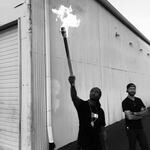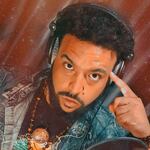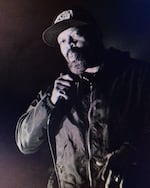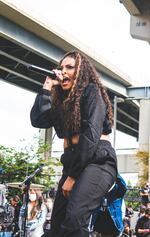
Portland rapper Rasheed Jamal
Photo courtesy of Rasheed Jamal
For Portland rapper Rasheed Jamal, hip-hop music is about describing the world around you.
Jamal started making music when he was a teenager, growing up in an all-Black Arkansas neighborhood, in a community that flew confederate flags downtown. Jamal uses music to reflect his reality, and the reality of Black America.
“Hip-hop has always been about what’s really going on in the neighborhood,” Jamal said.
Right now, in the midst of worldwide Black Lives Matter protests, Jamal and other Portland hip-hop artists sense that people are finally recognizing a reality they have been living for years.
On May 14, 11 days before Minneapolis police killed George Floyd and ignited a worldwide movement for Black lives, Jamal released a remarkably prophetic music video for his song "Urban Decay Pt. II."
It begins with Jamal waking up in the middle of a street, blood dripping from a gunshot wound in his chest. It ends with him rapping in a forest, and walking solemnly along a hazy beach.
“It’s just symbolic to me of humanity waking up from this place of being calcified and being closed off, and awakening to our true nature,” Jamal said. “This is not the first time Black people have stood up to fight for our rights — maybe it is the first time it has been accepted on a mainstream level.”
Black people have a tradition of “rising to the occasion,” Jamal said, through art or through politics. But to him, hip-hop alone cannot bring social change.
“I think music can be a bandaid that folks can listen to,” Jamal said. “If it could, Sam Cook would have done it. They play that song (‘A Change is Going to Come’) as background on movies when Black folks are getting abused. Music isn’t going to change anything … I think hip-hop’s place is telling the truth.”
Portland rapper C3 the Guru says he "channels the truth" through his music.
"We let the world speak through us," he told OPB's "Think Out Loud" on June 26.

Portland hip-hop artist C3 the Guru
Photo courtesy of C3 the Guru
C3 has been performing at Portland protests over the past few weeks. Like Jamal, C3 feels people are finally tuning in to a reality Black musicians have always known.
He calls his music “ceremonial-grade” hip-hop — a genre carrying on musical traditions started by Black artists 1000s of years ago, pre-colonization.
“As a ceremonial-grade hip-hop artist, I have to evolve empathically on a daily basis with the recognition that many, many many have come before me,” he said. “We are always here with the message, and we are just waiting for people to listen, and they’re listening now.”
Long-time Portland hip-hop artist and educator Mic Crenshaw thinks the coronavirus pandemic may also be impacting how people are listening to Black Lives Matter, as well as Portland hip-hop.
"For the first time, people have had the option to slow down and be present with things that they used to be too busy to pay attention to," Crenshaw told OPB's "Think Out Loud. "In my lifetime, this is the most amount of people I've seen responding specifically to violent white supremacist terror against Black lives all over the world."

Portland hip-hop artist Mic Crenshaw
Photo by Julie Keefe
And in order to sustain this response, rapper Karma Rivera believes joy is essential. Rivera recently performed at a Black Lives Matter protest organized by non-profit SNACK BLOCK near the Hawthorne Bridge.

Portland rapper Karma Rivera
Photo by Monique Simone
She started her set with “Can’t Trust,” a high-energy song. At first, Rivera said, she was nervous it would not match the serious tone of the protests.
"But as soon as that record dropped, it was like, everyone's energy changed — it went from super serious to, oh, everyone's dancing," she told OPB's "Think Out Loud."
“That's kind of where I fit in. My music isn't overly political. lt kind of tends to disregard respectable politics.”
Rivera is using music to support local organizers and activists. To her, building spaces where protesters can let loose is crucial to the Black Lives Matter momentum.
“Celebration sustains activism,” Rivera said.